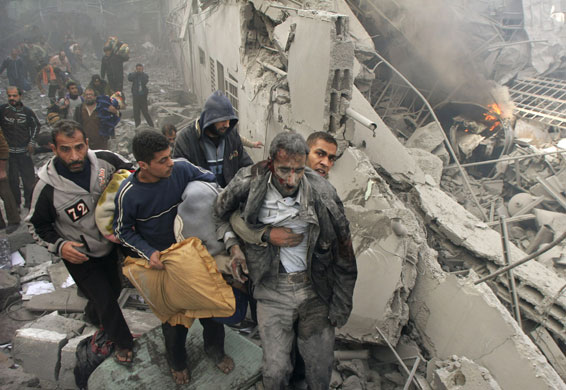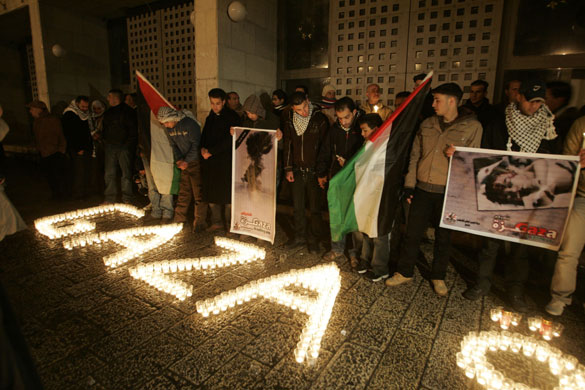
Melanie Phillips’ article “Beware the New Axis of Evangelicals and Islamists” published in the Spectator last week is libellous. It contains untruthful statements about me which may injure my reputation or standing in the community.
I have never said that I wish Israel, in her words, “to be destroyed” or to “disappear just as did the apartheid regime in South Africa.” I have never believed this and categorically reject any position that threatens the integrity of Israel as a sovereign nation.
On the contrary I have repeatedly stated in writing (for example here, here and here) that I wish to see a safe and secure Israel with internationally recognised borders, alongside a sovereign, viable, independent Palestine.
I have, however, spoken out against Holocaust denial as well as religious extremism. I have also highlighted British involvement in saving Jewish people from the Nazi Holocaust. I have specifically challenged Christians who see nothing incompatible with membership of the BNP.
Far from seeking to “appease radical Islam”, I have criticised Islamist attacks against Christians in Iraq here and here, as well as in Afghanistan. I have challenged Iran’s human right’s record here and here and commended an important book about the Church in Iran here.
I have never knowingly, to use her words, “given interviews to, endorsed or forwarded material from American white supremists and Holocaust deniers”. My publisher in the USA, InterVarsity Press, occasionally arrange TV and radio interviews for me with Christian stations to promote my books. I trust their judgement.
On her use of the term “islamofacism“, I subscribe to the view of a leading authority on Fascism, Walter Laqueur, who concluded that “Islamic fascism, Islamophobia and antisemitism, each in its way, are imprecise terms we could well do without but it is doubtful whether they can be removed from our political lexicon.” The best piece of writing I have seen recently on “Radical Islam” is by Fareed Zakaria in Newsweek.
I keep an extensive and growing mailing list and am no more responsible that Melanie Phillips is for how others make use of material I write, or forward, which is invariably from mainstream newspapers and journals. Unlike those who choose to use anonymous blogs and websites to express their opinions, I have made my own views plain and my external ministry public.
“we have renounced secret and shameful ways; we do not use deception, nor do we distort the word of God. On the contrary, by setting forth the truth plainly we commend ourselves to every man’s conscience in the sight of God.” (2 Corinthians 4:2).
To clarify my position and to anticipate such criticisms, in my book Zion’s Christian Soldiers?, I wrote the following:
“It is true that at various times in the past, churches and church leaders have tolerated or incited anti-Semitism and even attacks on Jewish people. Racism is a sin and without excuse. Anti-Semitism must be repudiated unequivocally. However, we must not confuse apples and oranges. Anti-Zionism is not the same thing as anti-Semitism despite attempts to broaden the definition. Criticising a political system as racist is not necessarily racist. Judaism is a religious system. Israel is a sovereign nation. Zionism is a political system. These three are not synonymous. I respect Judaism, repudiate anti-Semitism, encourage interfaith dialogue and defend Israel’s right to exist within borders recognised by the international community and agreed with her neighbours. But like many Jews, I disagree with a political system which gives preference to expatriate Jews born elsewhere in the world, while denying the same rights to the Arab Palestinians born in the country itself.”
I endorse the position taken by the Heads of Churches in Israel regarding the need for a peaceful resolution of the conflict.
Others such as former US President Jimmy Carter and Archbishop Desmond Tutu have made comparisons between Israeli policies in the Occupied Territories and South Africa under apartheid.
I do wish to see the present illegal occupation of Gaza, the Golan and the West Bank “disappear”, but only as a result of the peaceful implementation of all relevant UN Resolutions, the Roadmap to Peace previously agreed by the US, EU, Russia and UN in April 2003, and Annapolis Agreement of November 2007 and Quartet Statement of December 2008.
I have a high regard for Bishop Michael Nazir-Ali and the courageous stand he has taken on inter-faith as well as ecclesiastical issues. Indeed I helped organise and promote his recent visit to Guildford Diocese.
I also deeply regret hearing that Patrick Sookhdeo has received a death threat as a result of writing his recent book, Global Jihad. Unfortunately, it is increasingly common. I have too. Veiled threats even feature on pro-Zionist Christian websites that seem to want me dead. Another example on the same website has the author lament, “Unfortunately (in my opinion) we no longer publicly and immediately stone false prophets to death.” then a few sentences later asserts, “One of the latest in a very long line of succession is a false teacher by the name of Stephen Sizer.” Thankfully, the police take these threats seriously and have arranged a measure of additional protection for my family also.
Back to Melanie Phillips. Her inflammatory alleagations about my involvement in interfaith conferences or TV programmes, alongside Jewish or Islamic leaders, is a tried and tested method intended to alienate, isolate and silence the views of those deemed critical of her own. Prior knowledge of, or agreement with, the views of others invited onto radio or TV programmes or conference platforms is not a significant criteria I use to decide whether to participate. Gaining a hearing for an explicitly Christian perspective committed to peacemaking and non-violence is.
What saddened me most, however, about Melanie Phillips’ article, were her concluding remarks criticising the Archbishops and Bishops of the Church of England. This is what she wrote:
“Many will be deeply shocked that the Church of England harbours individuals with such attitudes. But the church hierarchy is unlikely to act against them. Extreme hostility towards Israel is the default position among bishops and archbishops; while the establishment line is to reach out towards Islam in an attempt to accommodate and appease it. With Christians around the world suffering forced conversion, ethnic cleansing and murder at Islamist hands, the church utters not a word of protest. Instead, inter-faith dialogue is the order of the day…”
I have been a Christian minister for just short of 30 years but have yet to meet a priest, let alone a Bishop or Archbishop who displays, “extreme hostility towards Israel” or who wishes to “accommodate and appease” Islam. Just the reverse. While there is clearly a spectrum of opinion on the best way to resolve the Arab-Israeli conflict within the House of Bishops, and the most appropriate way to present the good news of Jesus Christ in a multi-faith context, they are nevertheless united in opposing racism and religious intolerance whether directed toward Jewish people or Muslims.
One has to ask what has motivated her to compose such a mendacious and libellous caricature of Christians within the Church of England concerned for justice and peace in the Middle East? Is it to deflect attention from Israel’s recent wanton killing spree in Gaza? Or was it written out of frustration at the decision of the Church of England Synod to divest its shares in Caterpillar? Or just part of the wider Zionist lobby targetting Barak Obama’s new Administration? Or is it perhaps a precursor to an imminent pre-emptive attack against Iran? Lets hope not otherwise it won’t be the libel or calumny we are debating but whether her friends who seem anxious for Armageddon are right after all.
For answers – check out Melanie’s Wiki entry – that bastion of ‘objectivity’ and truth. It alleges,
“Phillips strongly defends Israel and its actions. She argues the Palestinians are an “artificial” people who can be collectively punished for acts of terrorism by Islamist terrorists because they are “a terrorist population”. She believes that while “individual Palestinians may deserve compassion, their cause amounts to Holocaust denial as a national project”.[12] She has repeatedly claimed that footage of those injured in Israeli attacks on Palestinian areas has been “fabricated/faked”.[13][14]
She frequently accuses Israel’s critics (including many Jews) of being motivated by anti-Semitism. She has described the paper “The Israel Lobby and U.S. Foreign Policy” written by John Mearsheimer and Stephen Walt as a “particularly ripe example of the ‘global Zionist conspiracy’ libel” and expressed her astonishment at what she calls “the fundamental misrepresentations and distortions in the paper”.[15]
In a recent article, she criticised the membership and leadership of the Anglican and Roman Catholic churches in Britain, and specifically the Archbishop of Canterbury, Dr. Rowan Williams, accusing them of antisemitism because of remarks made by the Archbishop about the plight of Bethlehem Christians under Israeli occupation; another factor was an opinion poll showing that the majority of Anglicans were opposed to the Israeli occupation of the West Bank. The article ended with a condemnation of what she sees as the churches’ failure to criticise the President of Iran’s desire to “destroy Israel”,[16] and that “the churches in Britain are not only silent about the genocidal ravings emanating from Iran but are themselves helping pave the way for a second Holocaust“.[17]
I think its time Melanie came back to church and stopped telling porkies.
For the official response from the Church of England – see here.

 Israel’s Channel 10 talk show mocks Christianity
Israel’s Channel 10 talk show mocks Christianity Twenty years in the writing, Canon Naim Ateek’s long awaited sequel to
Twenty years in the writing, Canon Naim Ateek’s long awaited sequel to 







 I am glad to commend a new book by Mark Bradley entitled,
I am glad to commend a new book by Mark Bradley entitled, 
